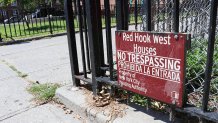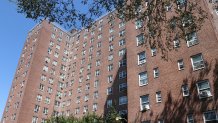An NBC 4 podcast on the fight to make NYCHA better. Click the boxes below to navigate between episodes.
Question Authority is a 6-part podcast about New York's public housing crisis. In Episode 3, working parents and the elderly are without gas for more than three months, and it hits their pockets hard. Now residents are fighting for compensation. Listen on Apple Podcasts or Stitcher or listen below.
ON FEBRUARY 13TH 2019, Vanessa McKnight went to make breakfast as usual. She lives in a 2 bedroom in NYCHA’s Red Hook West Houses. That morning, she says she tried to turn her gas range on, but nothing came out. After that, she says went without gas for 93 days.
“NYCHA didn’t do anything. We were complaining, and for the first 24 hours, there was no contact at all,” McKnight said. “They came in, cut the stove off, and left."
After some time, NYCHA responded by giving residents one hot plate per apartment. “I get a knock at the door and NYCHA workers had hot plates and handed them out to the apartments with the verbal message of, ‘the gas is out,’” said Shawn Gettes, McKnight’s neighbor.
“We don’t know when it will be back on. I was like, what?”

Gettes lives on the same gas line as McKnight, nine floors up, with his son and elderly mother. “Communication was horrible. Correspondence was horrible,” Gettes said. “It was vague. At points it was just nothing.”
In response, NYCHA says they provide regular updates, and that though they understand gas interruptions are inconvenient, they want to ensure resident safety as they work to restore service quickly.
The residents said at least 60 families in 6 different buildings had gas outages at the same time. And this wasn’t their first rodeo. A year before, in 2018, more than 400 residents went without gas for almost a month. NYCHA said that the restoration process takes multiple steps, including shutting off service, making repairs, getting inspections, and restoring the service. But while the gas outage was happening, the cost for the tenants was high.

“You have the one hot plate and you couldn’t hook up any additional hot plates because it would break the circuit. You had to cook everything one by one,” Gettes said. “If you’re a working parent, you work a 9-5, you get home at 6 pm. You start cooking at 6:30 pm, you’re not done cooking until 10 o’clock, that’s when kids are supposed to be in bed getting ready for school.”
Gettes said that because of this, he was pushed to buy meals more than he usually would. “I had to pay out of pocket to go to fast food restaurants and order out,” Gettes said. “It put a strain on my budget.”
Catherine McBride, Director of Community Building at Red Hook Initiative, said he was not the only one. “We had community member in our group that had diabetes, other health issues where they really needed to cook their own food,” McBride said. “Not being able to do that meant that they had to spend more of their own money each week on eating in restaurants or buying prepared foods.”

The residents began to meet with each other to try to get their gas back. They reached out to the media and McKnight said she and the other residents took out Housing Part Actions, or HP Actions. Basically, an HP Action is a court case tenants can bring against NYCHA to force them to make repairs.
“We used the HP cases to help and show the severity of the situation,” McKnight said. “We had to hit every angle we knew to bring attention to it.”
In the meantime, they tried to find food for those who could not cook. McBride said NYCHA was supposed to help—more than it did. “NYCHA is supposed to fund a restaurant stipend, but one, no one knew that until we got together and started talking about it, and two it was really hard to access even after we all knew about it, knew the steps that people had to take to access the vouchers,” McBride said. “I think only two people got it and the amount that they got was nothing. It was, like, $40.”
When asked, NYCHA gave no comment on the stipends. And even after all of this collective effort, it still took over 3 months for Vanessa and Shawn to get their gas back. And as of July 2019, there is still another fight playing out: they want some of their rent money back for all the time they had to go without gas. “It’s the warranty of habitability law, and that’s not respected for NYCHA residents,” McBride said.
Every renter is protected by the Implied Warranty of Habitability. Basically, that means all rentals have to be fit for living in. It does not have to be written into the lease for it to be in effect. Courts in New York see gas as an essential function. This means NYCHA has likely breached the warranty and the residents could get some of their money back.
“For the entire interim of this whole process I was still paying full rent as if I was living in a fully functional, habitable apartment and I wasn’t. I was not,” Gettes said. “It wasn’t fully habitable. I had no choice but to stay there.”

In our interview with the new Chair of NYCHA, Gregory Russ, Russ said abatements are definitely a possibility—though he worries about whether NYCHA can afford them or not.
"The question for us is to what degree would that impact our ability to operate. Because let’s face it we collect a billion dollars of rent per year and the rent is critical to us being able to do anything on the property. I think our question is can we treat ppl fairly given their circumstance in the unit and can we do it in a way that we’re not in a place where the bottom drops out of our income."
While they fight for refunds, both McBride and McKnight are convinced that this won’t be the end of the outages at Red Hook West. “I do think there will be more outages,” McBride said. “It’s a symptom of disinvestment and larger issues that the agency is facing.”
“I can bet my sweet bippy that we’re definitely, definitely going to have more outages. Definitely,” McKnight said. “And they’re going to come rapidly.”
But McKnight said she is still an optimist. “We try to keep it positive here. Strong community, very strong and resilient community here,” McKnight said. “The situation’s only going to get worse. The plus is that we now know how to navigate this system. They made us self-advocate and get it done.”
Question Authority was researched, written, produced, and edited by Liam McBain. The executive producer is Jessy Edwards, with additional help from Ben Berkowitz and John Cuthbert.

